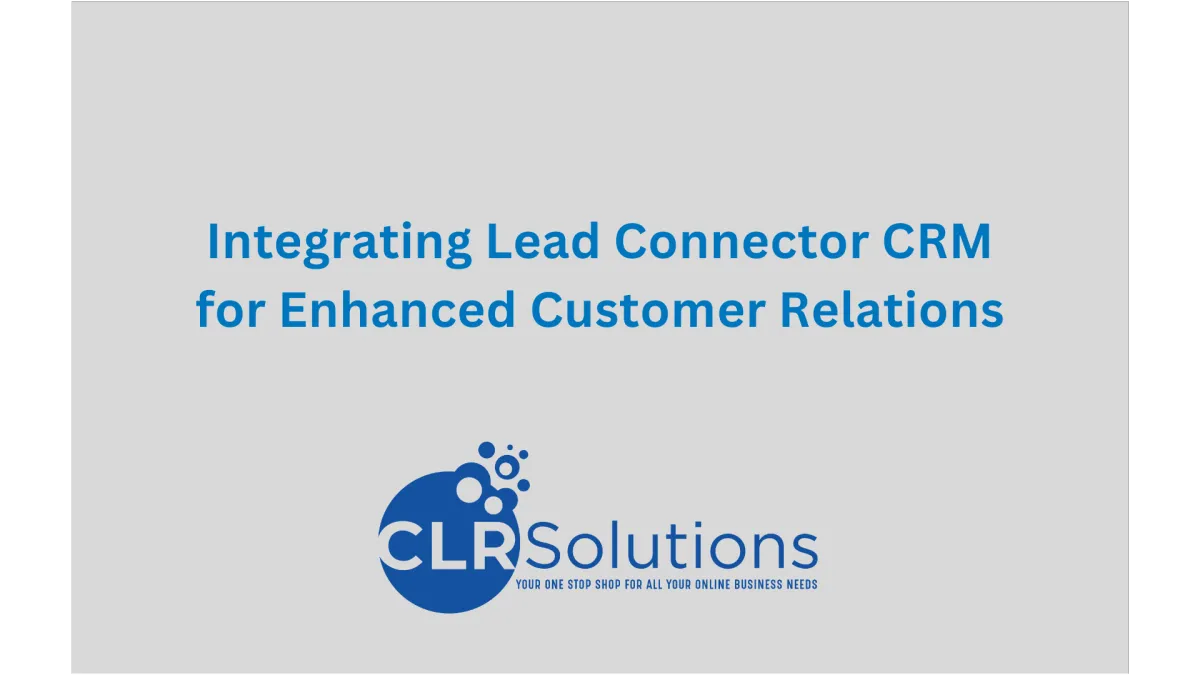
Blog Posts

Integrating Lead Connector CRM for Enhanced Customer Relations: A Guide by CLR Solutions
In today's fast-paced business world, maintaining strong customer relationships is crucial for success. Customer Relationship Management (CRM) systems like Lead Connector CRM have emerged as vital tools for managing these relationships effectively. Integrating a CRM system into your business operations can streamline processes, improve customer engagement, and ultimately drive growth. CLR Solutions offers a guide on how to successfully integrate Lead Connector CRM into your business for enhanced customer relations.
Understanding the Importance of CRM in Modern Business
The first step in successful CRM integration is understanding its importance. CRM systems are more than just databases; they are tools that help manage interactions with current and potential customers, track sales leads, and provide insights into customer behaviors and preferences. Effective use of a CRM like Lead Connector can result in more personalized customer experiences and improved customer satisfaction.
Choosing the Right CRM for Your Business
Selecting the right CRM is essential. Lead Connector CRM offers a range of features, but it’s important to assess whether these align with your business’s specific needs. Consider factors like the size of your business, the complexity of your sales processes, and the level of customer interaction you require. Ensure that the CRM you choose can be easily integrated into your existing systems and workflows.
Training Your Team for Effective CRM Usage
Implementing a CRM system is only as effective as the team using it. Comprehensive training for your team is crucial to ensure they are comfortable and proficient with the new system. This training should cover how to input data, track customer interactions, manage sales leads, and use any automated features the CRM offers. Regular training sessions and refresher courses can keep your team up-to-date with any new features or updates.
Integrating CRM into Sales and Marketing Processes
Integrating Lead Connector CRM into your sales and marketing processes can significantly improve efficiency. Use the CRM to track sales leads through the sales funnel, create targeted marketing campaigns, and automate follow-up emails. This integration ensures that customer data is consistently used to inform sales strategies and marketing efforts.
Leveraging CRM Data for Customer Insights
One of the most significant advantages of a CRM system is the data it provides. Use Lead Connector CRM to analyze customer interactions, purchase history, and feedback. This data can offer valuable insights into customer preferences and behavior, enabling you to tailor your products, services, and marketing messages to better meet customer needs.
Personalizing Customer Interactions
Personalization is key in customer relations. Use the information stored in your CRM to personalize interactions with customers. This could be as simple as addressing customers by their name in communications or as complex as offering personalized product recommendations based on their purchase history.
Evaluating and Adapting Your CRM Strategy
Finally, regularly evaluate the effectiveness of your CRM strategy. Gather feedback from your team and customers to understand what is working and what needs improvement. Be open to making changes and adapting your approach to ensure that your CRM integration continues to meet the evolving needs of your business and customers.
Conclusion
Integrating Lead Connector CRM into your business operations can revolutionize the way you manage customer relations. By selecting the right CRM, training your team, integrating it into your sales and marketing processes, leveraging data for insights, personalizing customer interactions, and regularly evaluating your strategy, you can enhance customer engagement and drive business growth. At CLR Solutions, we believe that a well-implemented CRM system is a key component in building strong, lasting customer relationships in today’s digital age.
